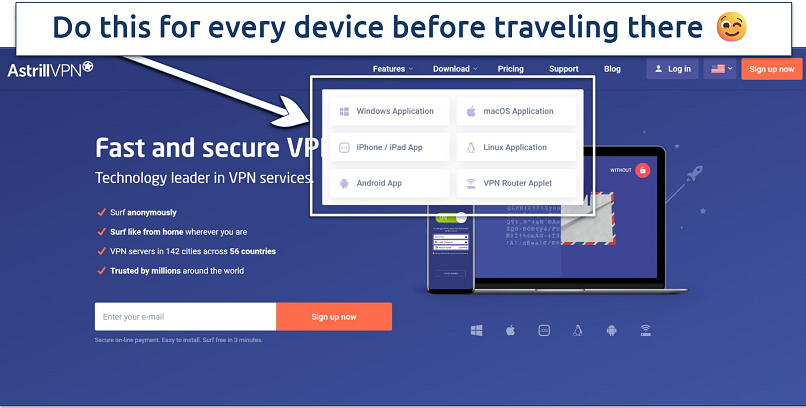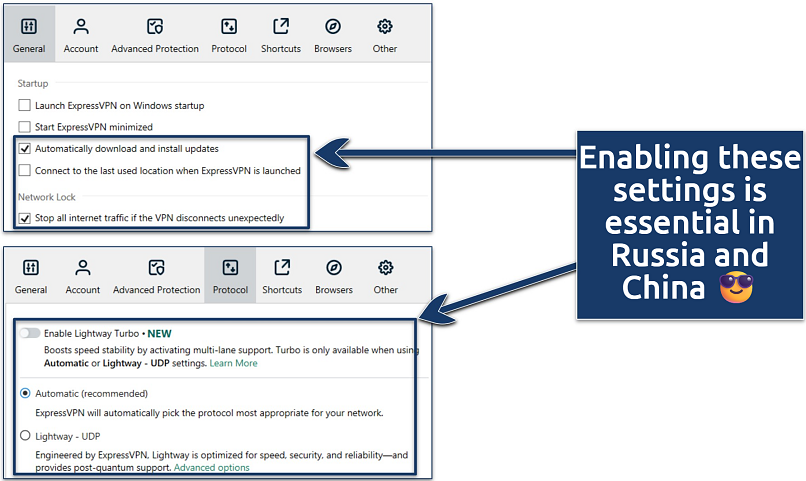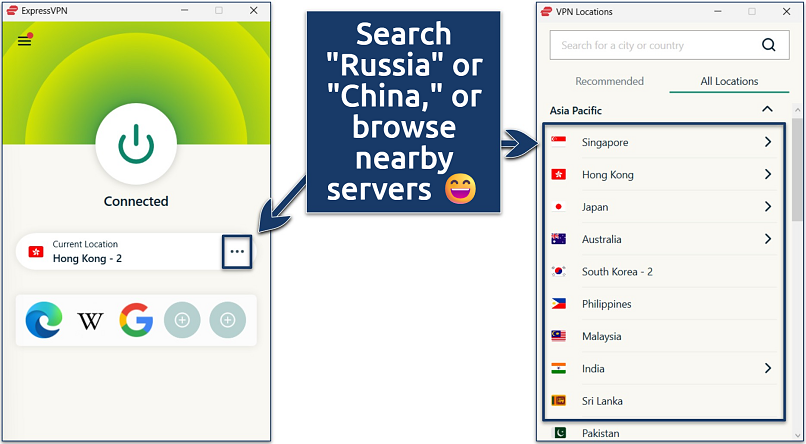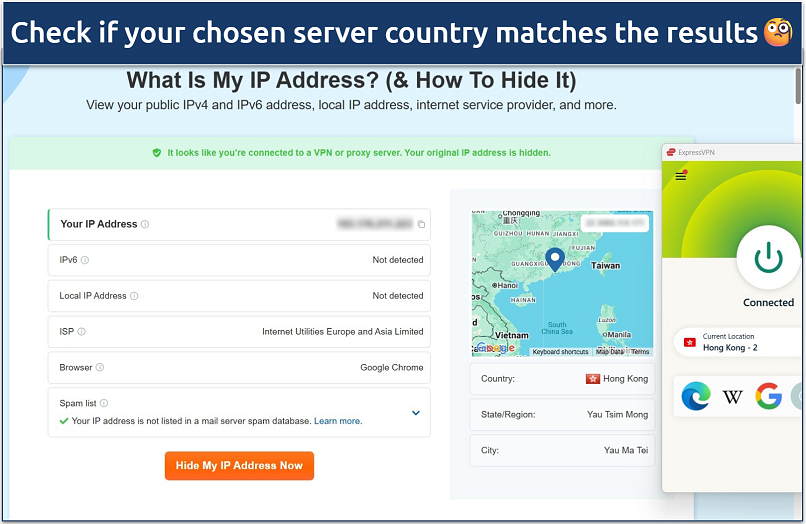How To Use a VPN in Russia and China: Still Working in 2026
- How Do You Get a VPN To Work in Russia and China?
- How To Set Up and Use a VPN in Russia or China
- Quick Comparison Table: Best VPNs for Russia and China
- What If My VPN Is Not Working in Russia or China?
- Why Do Countries Like China and Russia Block VPNs?
- Can You Use a Free VPN in China or Russia?
- FAQs on Using VPNs in Russia and China
Russia and China actively take measures to block non-government-operated VPNs. You can’t even find the VPNs in the app stores of these countries. The ones that remain accessible are mostly government-approved, which aren't privacy-friendly.
What’s a good VPN to use in Russia and China? A VPN with military-grade encryption and obfuscation (conceals VPN traffic) works most reliably in Russia and China. Meduza reports that Russian authorities blocked over 885,000 websites in 2023¹. So, a VPN should also have thousands of IP addresses worldwide to maintain access to websites and apps from anywhere.
How Do You Get a VPN To Work in Russia and China?
- Get a VPN.
Ideally, you should do this before travelling to China or Russia. Choose one with servers in Russia, China, or nearby locations, depending on your needs. Download and install the VPN on the devices you want to use. - Connect to a server.
Enable settings like the kill switch, IP/DNS leak protection, and obfuscation if they aren’t already on. Then, connect to a nearby server — the closer it is to your location, the faster your speeds will be. - Browse safely.
Make sure your VPN stays connected at all times to keep your activity private in Russia, China, or abroad.
How To Set Up and Use a VPN in Russia or China
The most dependable way to secure your connection in Russia or China is by using a VPN with obfuscation technology, which is also compatible with all major devices. By hiding VPN traffic as regular internet traffic, services with obfuscation help maintain stable connections to all popular apps and websites.
Can you access the internet with a VPN in China and Russia? Both countries rank among the most restrictive regarding VPN use. Freedom House reports that in March 2024, Russia’s telecom regulator blocked 30 web pages2 just for sharing how to use VPNs to access social media. The same source rates China’s internet freedom a mere 9 out of 100, marking it as one of the most restrictive nations3. It also highlights China’s push to limit VPN use.
So, even the best VPNs will occasionally face issues working within Russian or Chinese borders. I’ve put together the guide below to help you maximize your chances of secure browsing, maintain a stable connection, and minimize disruptions in these highly restrictive environments.
1. Choose a VPN That Works in Russia or China
Go for a VPN with strong traffic-hiding capabilities to reduce the risk of blocks. Also, ensure it has an extensive server network to safely access a wider range of content and avoid slowdowns due to overcrowding.
2. Download the App
If you're traveling to Russia or China, installing your VPN before you arrive is critical. Most VPN websites and app store listings are not available in either country, so the best approach is to download the VPN app from an official website or app store in advance.
 The alternative is to contact the VPN's support and request the mirror URL
The alternative is to contact the VPN's support and request the mirror URL
3. Adjust Your VPN Settings for Smooth Performance
Enable features like obfuscation, the kill switch, and app binding. Obfuscation scrambles the connection so that it’s harder for anyone to see that you’re using a VPN and block your connection because of it. A built-in kill switch, binding certain apps/websites, or using automatic WiFi protection helps prevent using the internet unprotected or leaking your actual IP.
Most premium VPNs automatically enable IP/DNS leak protection for all connections. Still, it’s very important to prevent location/IP conflicts, so make sure to enable it (and keep it on) if you plan to use a VPN in Russia or China. If you’re having issues, try different combinations of ports and protocols — experimentation is key in these countries.
 ExpressVPN, for example, automatically uses obfuscation with the Lightway protocol
ExpressVPN, for example, automatically uses obfuscation with the Lightway protocol
4. Choose a Server
Many top VPN services avoid having servers in China or Russia to prevent data collection. Connect to servers in nearby locations, such as Belarus, Hong Kong, or Macau, to securely access regional sites at top speeds. The best VPNs for China and Russia have secure servers worldwide.
 You can also usually set the VPN to connect automatically at system or app startup
You can also usually set the VPN to connect automatically at system or app startup
5. Run an IP Leak Test
Verify your VPN connection is secure before using the internet in Russia or China. Use an IP leak testing tool to confirm your real location isn't visible. A properly configured VPN should only show your chosen server location, not your actual location. If you're connected to a server in Russia or China, double-check that your IP address looks different after you connect.
 Run the test before and after connecting to the VPN to confirm that your IP has changed
Run the test before and after connecting to the VPN to confirm that your IP has changed
6. Start Browsing Securely
You're now ready to access content and services from Russia or China securely. Whether you're catching up on local news or just browsing, keep your VPN connected. Doing so hides your online activity and location from snoops, ISPs, network-level monitoring (at school, work, airport, hotels, etc.), and DPI (if the VPN has obfuscation features).
 The VPN app should clearly display if your connection is still active
The VPN app should clearly display if your connection is still active
Quick Comparison Table: Best VPNs for Russia and China
Due to their unique circumstances, not every VPN will work equally well in Russia and China. It’s best to choose a VPN based on your primary need, whether it’s safely accessing websites and apps or keeping your online activity private. The table below will give you a quick overview of where each VPN excels:
What If My VPN Is Not Working in Russia or China?
If your VPN isn’t working in Russia or China, you might’ve selected one that isn’t reliable, or it’s just blocked, so you might need a new one.
If the VPN you selected normally works, but it doesn’t now, you can try the following:
- Connect to another server. The server you’ve chosen might be overloaded, or its IPs might be blocked, so simply changing the server can help you get the VPN working.
- Change the VPN protocol. Protocol choice is very important when it comes to using a VPN in these countries. Usually, VPNs that offer obfuscation either have a separate protocol that activates this feature or one with “stealth” in the name, so go with that one. Otherwise, automatic protocol selection could work as well. Check with your VPN’s customer support to make sure which one to use.
- Update the VPN app. Using an outdated version of the VPN app can pose some issues, so make sure that you always update it to the latest version.
- Try the VPN’s obfuscation/stealth mode. Not all VPNs offer this, and some limit which servers or protocols can use obfuscation. This is often the single biggest fix in censoring countries.
- Switch ports (use TCP/443). Few VPNs allow this, but changing the port can help avoid surface-level blocks. If offered, enable newer transport wrappers (QUIC/HTTP3 / MASQUE-style masking). These make VPN traffic look like ordinary HTTPS/HTTP3 and can bypass DPI.
- Disable IPv6. IPv6 can cause DNS leaks even with IPv4/DNS leak prevention turned on, so more VPNs are offering the ability to turn it off. If you keep getting DNS errors, try flushing DNS using the command line.
- Try a different network. Internet users often report different results using mobile service or even different hotel WiFis, particularly in China. Try different devices and connection methods if you’re having issues.
- Contact the VPN’s customer support. If none of the above tips help, your VPN’s customer support team can help you by giving you specific instructions on what servers and settings to select so that the VPN works in Russia or China.
Why Do Countries Like China and Russia Block VPNs?
China and Russia enforce stringent controls over VPN usage to maintain authority over digital information and suppress dissent. VPN technology isn’t inherently illegal and is still an essential tool for many foreign businesses, activists, journalists, and workers. Government-approved VPN services also operate in both countries.
Can foreigners use VPNs in China and Russia? It’s possible, but both countries try to prevent the use of unauthorized VPNs because they may be used to circumvent restrictions. Russia, for example, has had an official ban against non-compliant VPNs since 2017 (Reuters)4. China’s Great Firewall was explicitly built to control the cross-border flow of information online.
However, there are some important differences in how each country exercises its online control and what content is targeted. Both countries have also recently stepped up censorship, so it’s tougher than ever to get a VPN to work reliably and safely access everything you want.
Here’s the most important information you should know:
Internet Restrictions in Russia
Russia combines both legal and technical measures to police online access under its “sovereign internet” framework. Over 400,000 websites and online resources are already blocked in the country (Vyorstka, 2024)5, including Facebook, X, YouTube, BBC, and more. A 2017 law even requires that VPNs block access to Kremlin-banned sites or face being blocked.
Russia is stepping up both its censorship laws and VPN restrictions. A new law made even using search engines to look for “extremist” content illegal. In addition to instructing Apple to pull 25 VPN apps from its store6, lawmakers are still considering new regulations for a total VPN ban. Promoting VPN-like tools is also not allowed, which includes blocking most commercial VPNs websites.
Internet Restrictions in China
China’s Great Firewall combines DNS/IP blocking, SNI/TLS filtering, deep packet inspection, and large-scale traffic shaping to restrict online access. This cuts off access to many international websites, leaving the country with a near-parallel internet. Local alternatives like WeChat, Baidu, and iQIYI exist for almost all popular social platforms and online services.
The new regulations on the management of network data security further tighten rules on data handling and cross-border transfers. While PIPL/DSL-era enforcement is still widely used, censors are also continuously working to strengthen the detection of obfuscated communications. As a result, common anti-censorship tools like Tor and obfs4/Snowflake rarely work there.
The main difference is that Russia is still primarily relying on ISPs to block unapproved content. In China, control is centralized by the CCP under its Great Firewall project. China’s censorship and surveillance are more mature and effective, but Russia is also expanding its TSPU to centralize controls that mirror aspects of China’s Great Firewall.
Can You Use a Free VPN in China or Russia?
Probably not. Free VPNs don’t usually have the resources to invest in the obfuscation technology necessary to work in these countries. That’s why it's recommended to use a premium VPN with a money-back guarantee and the ability to avoid detection.
There are a few free VPNs that work in Russia and China, but they typically come with major trade-offs like limited server selections, bandwidth, or speeds, restricting what you can do.
The ones that claim to work without such limits often carry bigger risks. Plenty of them stay afloat by selling your data to advertisers and other third parties. And others aren’t VPNs at all — just scams or malware in disguise.
Moreover, a recent study revealed that 12 out of 24 free VPN apps have secret ties to Russia or China7. Many of these even claim to work in either or both of those countries — a red flag you shouldn’t ignore. So, it’s important to scrutinize any VPNs marketed for China or Russia, as they might be working with the authorities to surveil you.
FAQs on Using VPNs in Russia and China
References
- https://meduza.io/en/news/2023/09/07/russian-authorities-reportedly-blocked-more-than-885-000-websites-in-first-half-of-2023/
- https://freedomhouse.org/country/russia/freedom-net/2024/
- https://freedomhouse.org/country/china/
- https://www.reuters.com/article/us-russia-internet/putin-bans-vpns-to-stop-russians-accessing-prohibited-websites-idUSKBN1AF0QI/
- https://www.pravda.com.ua/eng/news/2025/01/28/7495694/
- https://www.reuters.com/technology/russia-says-apple-blocks-25-vpn-apps-russia-ifx-reports-2024-07-04/
- https://www.techradar.com/vpn/vpn-privacy-security/free-vpn-apps-found-to-have-ties-with-russia-and-china-and-theyre-hiding-in-google-and-apples-app-stores/
- https://www.scmp.com/news/china/policies-politics/article/2125326/man-jailed-51/2-years-fined-us76000-selling-vpn/
- https://www.theguardian.com/world/2023/oct/09/chinese-programmer-ordered-to-pay-1m-yuan-for-using-virtual-private-network/
- https://analyzify.com/statsup/vpn/
- https://www.voanews.com/a/china-s-vpn-usage-nearly-doubles-amid-internet-censorship/7488465.html/
Your online activity may be visible to the sites you visit
Your IP Address:
216.73.216.188
Your Location:
US, Ohio, Columbus
Your Internet Provider:
Some sites might use these details for advertising, analytics, or tracking your online preferences.
To protect your data from the websites you visit, one of the most effective steps is to hide your IP address, which can reveal your location, identity, and browsing habits. Using a virtual private network (VPN) masks your real IP by routing your internet traffic through a secure server, making it appear as though you're browsing from a different location. A VPN also encrypts your connection, keeping your data safe from surveillance and unauthorized access.



Please, comment on how to improve this article. Your feedback matters!